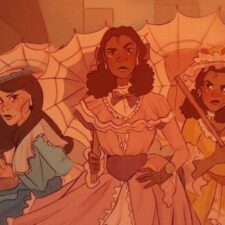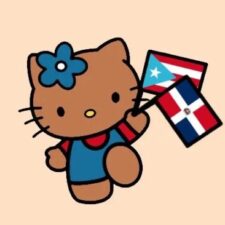You must be logged in to reply to this topic.
- "The World According to Bad Bunny" Sentences and Paragraphs
-
September 6, 2023 at 6:31 pm #87884

Adin DobkinParticipantPlease share in the space below!
September 8, 2023 at 1:05 pm #87995
DestinyParticipantA sentence that really stood out to me was “What Puerto Ricans speak is “barely Spanish,” I’ve been told more than once by sophisticated American liberal who read Roberto Bolano in translation.” This is not true because a lot of Puerto Ricans speak Spanish and have been for as long as they have lived on the island of Puerto Rico. This paragraph stood out to me because it shows how he started to make songs and who he was able to work with as well,“Benito began making beats and freestyling in his bedroom as a young teenager with his friends, some of whom remain his closest collaborators. He introduced Ormani to FruityLoops a solid decade before the two of them broke the internet with a deliciously dirty, densely referential homage to the megamixes Puerto Rican D.J.s used to play at garage parties back in the early aughts, when figures like DJ Nelson were among the island’s biggest stars and mixtapes like “Más Flow” were hotter than single-artist albums. Benito has repeatedly described “YHLQMDLG” as “the album that reggaeton deserves,” and it pays a debt of gratitude by featuring many of the genre’s elder statemen: Jowell and Randy, Yaviah, the one and only Daddy Yankee.”
-
This reply was modified 1 year, 4 months ago by
 Destiny.
Destiny.
September 10, 2023 at 11:09 pm #88077
Halley C OteroParticipant“I count myself among those who must embark on a program of cultural reclamation to follow his clever flow and hyperlocal allusions.” This quote essentially means that Bad Bunny had tried to push himself to be as genuine, original, and true to his roots in the industry for his music. This is also said because many people in the industry don’t stay true to their culture or where they started. They tend to branch out and forget where they came from. they also forget how far they came. I think in 2023 Bad Bunny is a different person compared to who he was in 2020.
September 11, 2023 at 12:30 pm #88092
Arleth RParticipantA paragraph that stands out to me is “When I finally met Bad Bunny – not Bad Bunny the star, just Benito – he seemed a little haunted by the specter of his significance: “I feel like I’m an athlete representing Puerto Rico in the Olympics. It’s … diablo. …” It turns out the world knows very little about his homeland. The hurricane forced Americans to learn a few basic facts they were never taught in school: Puerto Rico is a so-called commonwealth of the United States, and Puerto Ricans are so-called citizens, even though they can’t vote for president and have no voting representatives in Congress. But when most people think of Puerto Rico, Benito says,”they think of reggaeton.” A sentence that stood out to me is “Bad Bunny cracked the “Gringo market.”
September 11, 2023 at 2:26 pm #88101
ChristopheParticipant“His experince wasn’t unique. What scandalized the public and galvanized an often-complacent middle class was the extremely vulgar languange these privilaged elites used in their messages to denigrate almost every sector of Puerto Rican society.” This quote stuck out to me because it’s essensially showing how people are divided into heirachy which makes them more susceptible to harassment from higher class individuals or groups. This happens to mostly everyone, everywhere and its messed up how people can view others as “lower than them” because they weren’t born or brought themselves up to such a societal class.
September 11, 2023 at 2:33 pm #88102
Xx_Justin_xXParticipantThe only paragraph that stands out to me is “I count myself among those who must embark on a program of cultural reclamation to follow his clever flow and hyperlocal allusions. I’m delighted when I can rap my way smoothly through even a few verses on a midtempo track like “Pero Ya No”: “ahora me gusta otra sicaria que vive por Bayamón/a mí ya no me cachas, yo no soy un Pokémon/tengo a otra que me brinca hasta que se joda el camón/no quiero que me llores, no vengas con el dramón.” The pleasure is in the deliberately heavy-handed end rhymes and what they draw into relation: a rough-riding suburb of San Juan, a multidimensional children’s game, a ravaged mattress, an exaggerated performance of remorse.” because it’s something I try doing often. The sentence that I remember most is “To me this is still “the sweetest talk in the world,” the stickiest. Even those who deride it can’t kill their own taste for it.”
September 11, 2023 at 3:28 pm #88108
KimberlyParticipantA sentence that stood to me was “Bentio came into the world with mainstreaming of reggaeton, when a quirky, introverted kid from the country, with no taste for the streets, had access to the music descending from underground mixtapes once sold at pickup points in the projects and exchanged in San Juan’s high school parking lots.” As Bad Bunny gained his fame I wonder how he felt because he is from a small country who gets criticized because by different stereotypes and etc. Knowing the fact that he is about to change the world with his voice and bring up the country he is from.
September 11, 2023 at 3:35 pm #88109
Ishvar HarrichandParticipantThere is one thing that stood out to me in the article “There was so many songs I sang without knowing what the hell they meant”. This stood out to me a lot because I can relate to their person. Like a person who understands the language but don’t understand the true meaning of the song. This is something that I struggle with. There is a bunch of English songs that I understand the meaning but what if the artist had a true meaning that he was expressing, and we didn’t know how to understand the song. This is something I don’t understand and struggle with.
September 11, 2023 at 10:25 pm #88140
IngridParticipantThe third anniversary of Hurricane Maria’s landfall in Puerto Rico— Bad Bunny descended unexpectedly on my city. On YouTube, I watched him cruise down the GrandConcourse in the Bronx on top of a semi truck styled to look like a graffitied subway car, a stream of exuberant pedestrians running in his wake. “Dreaming is everything,” Benito had told me, and this vision was indeed dreamlike: a larger-than-life enchantment of our quotidian reality here in the uptown corridors where so many corridors where so many Puerto Ricans have become and refused to become Americas. He wore all black—sunglasses, a long leather coat—like a true New Yorker, but also like a man in mourning, like the black resistance flag that has dominated street protest in Puerto Rico since the passage of PROMESA.
September 13, 2023 at 3:57 pm #88191
Halley C OteroParticipanth
-
This reply was modified 1 year, 4 months ago by
 Halley C Otero.
Halley C Otero.
September 13, 2023 at 3:58 pm #88192
Halley C OteroParticipantI count myself among those who must embark on a program of cultural reclamation to follow his clever flow and hyperlocal allusions. I’m delighted when I can rap my way smoothly through even a few verses on a midtempo track like “Pero Ya No”: “hora me gusta otra sicaria que vive por Bayamón/a mí ya no me cachas, yo no soy un Pokémon/tengo a otra que me brinca hasta que se joda el camón/no quiero que me llores, no vengas con el dramón.” The pleasure is in the deliberately heavy-handed end rhymes and what they draw into relation: a rough-riding suburb of San Juan, a multidimensional children’s game, a ravaged mattress, an exaggerated performance of remorse.
I count myself among those who must embark on a program of cultural reclamation to follow his clever flow and hyperlocal allusions. I’m delighted when I can rap my way smoothly through even a few verses on a midtempo track like “Pero Ya No”: “hora me gusta otra sicaria que vive por Bayamón/a mí ya no me cachas, yo no soy un Pokémon/tengo a otra que me brinca hasta que se joda el camón/no quiero que me llores, no vengas con el dramón.” The pleasure is in the deliberately heavy-handed end rhymes and what they draw into relation: a rough-riding suburb of San Juan, a multidimensional children’s game, a ravaged mattress, an exaggerated performance of remorse.
I count myself among those who must embark on a program of cultural reclamation to follow his clever flow and hyperlocal allusions. I’m delighted when I can rap my way smoothly through even a few verses on a midtempo track like “Pero Ya No”: “hora me gusta otra sicaria que vive por Bayamón/a mí ya no me cachas, yo no soy un Pokémon/tengo a otra que me brinca hasta que se joda el camón/no quiero que me llores, no vengas con el dramón.” The pleasure is in the deliberately heavy-handed end rhymes and what they draw into relation: a rough-riding suburb of San Juan, a multidimensional children’s game, a ravaged mattress, an exaggerated performance of remorse. -
This reply was modified 1 year, 4 months ago by
You must be logged in to reply to this topic.


